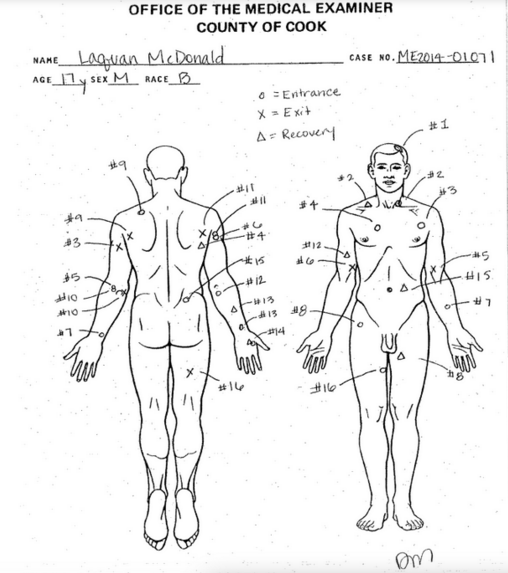The Totally Absurd Way Officials Botched Laquan McDonald's Killing

By:
Laquan McDonald was fatally shot by a Chicago police officer on October 20, 2014. Former officer Jason Van Dyke shot the 17 year old 16 times over the course of 15 seconds—13 seconds of which he was on the ground—in a disturbing scene that was captured on dash cam video and released on Tuesday, at the order of a county judge.
City and police officials mishandled this case, a conclusion that many have come to over the 400 days since the shooting occurred. It wasn't just the delay of the dash cam video's release; it was the history of misconduct of the officer in question, the misleading statements of authorities who defended Van Dyke, and the failure to charge him even after video seemed to prove that he had, at the very least, violated police protocol.
Now, compare their response to how authorities handled the fatal shooting of Sam DuBose, a 43-year-old man who was killed by a University of Cincinnati police officer in July, and you'll understand why.
RELATED: Chicago Police Release Video of Laquan McDonald's Death
What happened in Chicago.
Van Dyke was charged with first-degree murder hours before the video's release—and over a year after the incident happened—the outcome of a criminal probe launched by state attorney Anita Alvarez.
Protestors descended upon the streets of Chicago Tuesday night to voice a growing list of complaints over the handling of this case.
While Van Dyke's appearance in court marked the first time an on-duty Chicago officer had been charged with murder in nearly 35 years, it does not make up for the fact that the city and Chicago Police Department failed to hold the officer accountable for 400 days—and only did so when they learned that the video's release was imminent.
It does not make up for the fact that the day after the shooting, a police union spokesperson insisted that McDonald "lunged" at Van Dyke, causing him to fear for his life—an allegation that the video plainly proves is false. McDonald had a knife, and a toxicology report showed that he had PCP in his system, but he was walking away from Van Dyke when the officer opened fire, and the two were separated by about 15 feet.
 Twitter - twitter.com
Twitter - twitter.com
"Chicago had an opportunity to get something right with law enforcement," Shaun King, a reporter at the New York Daily News who has extensively covered police brutality in the U.S., told ATTN:. But rather than seize that opportunity, officials opted for inaction.
What they should have learned from Cincinnati.
By comparison, when campus police officer Ray Tensing shot and killed Sam DuBose on July 19, he was indicted on charges of murder and involuntary manslaughter ten days later. At a press conference, Hamilton County Prosecutor Joe Deters called the shooting "totally unwarranted," "senseless," and "an absolute tragedy." While Cincinnati police and city officials have their own set of problems, this reasoned response ought to have served as an example for Chicago, King explained.
King added:
"The city knew. The city was like, this is ugly, this is heinous. We're not going to ignore it, but we're also not going to allow our city to devolve into constant frustration. We have to arrest this man, we have to fire him. And so cities know how to do it, but Chicago doesn't."
In both cases, the dash cam footage of the shooting offered immediate reason to act, to discipline and enforce the law against violations of use of deadly force policy by trained police officers. In Cincinnati, that response came 10 days later; in Chicago, it took 400 days and a court order.
RELATED: Chicago Officer Who Shot Laquan McDonald Was On Payroll For 400 Days After Incident
There are a number of ways that Chicago botched the Laquan McDonald case.
They are not limited to the amount of time it took to call for criminal charges. There are allegations, for example, that Chicago officers visited a Burger King to delete surveillance recording of the shooting. And activists have also cited the fact that Van Dyke amassed 18 civilian complaints over 14 years, "including allegations that he used racial epithets and excessive force," the Associated Press reported.
None of those complaints were sustained, and that's apparently part of a theme in Chicago policing.
"[T]he data for 2015 shows that in more than 99 percent of the thousands of misconduct complaints against Chicago police officers, there has been no discipline," the New York Times reported. "From 2011 to 2015, 97 percent of more than 28,500 citizen complaints resulted in no officer being punished, according to the files."
Chicago mishandled the Laquan McDonald shooting. That much is clear. But as policing practices—and specifically, instances of police brutality—continue to face scrutiny in the U.S., it is important to remember that there is a right way and a wrong way to manage police misconduct.
Sam DuBose's death, like Laquan McDonald's, is a tragedy. But officials in Cincinnati showed that justice can be served, effectively and promptly, as long as accountability and transparency remains an institutional priority.
